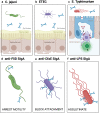The prospect of orally administered monoclonal secretory IgA (SIgA) antibodies to prevent enteric bacterial infections
- PMID: 34491878
- PMCID: PMC9103515
- DOI: 10.1080/21645515.2021.1964317
The prospect of orally administered monoclonal secretory IgA (SIgA) antibodies to prevent enteric bacterial infections
Abstract
Eliminating diarrheal diseases as a leading cause of childhood morbidity and mortality in low- and middle-income countries (LMICs) will require multiple intervention strategies. In this review, we spotlight a series of preclinical studies investigating the potential of orally administered monoclonal secretory IgA (SIgA) antibodies (MAbs) to reduce disease associated with three enteric bacterial pathogens: Campylobacter jejuni, enterotoxigenic Escherichia coli (ETEC), and invasive Salmonella enterica serovar Typhimurium. IgA MAbs targeting bacterial surface antigens (flagella, adhesins, and lipopolysaccharide) were generated from mice, humanized mice, and human tonsillar B cells. Recombinant SIgA1 and/or SIgA2 derivates of those MAbs were purified from supernatants following transient transfection of 293 cells with plasmids encoding antibody heavy and light chains, J-chain, and secretory component (SC). When administered to mice by gavage immediately prior to (or admixed with) the bacterial challenge, SIgA MAbs reduced infection C. jejuni, ETEC, and S. Typhimurium infections. Fv-matched IgG1 MAbs by comparison were largely ineffective against C. jejuni and S. Typhimurium under the same conditions, although they were partially effective against ETEC. While these findings highlight future applications of orally administered SIgA, the studies also underscored the fundamental challenges associated with using MAbs as prophylactic tools against enteric bacterial diseases.
Keywords: Enteric; antibody; infection; prophylactic.
Figures
Similar articles
-
Investigation of a monoclonal antibody against enterotoxigenic Escherichia coli, expressed as secretory IgA1 and IgA2 in plants.Gut Microbes. 2021 Jan-Dec;13(1):1-14. doi: 10.1080/19490976.2020.1859813. Gut Microbes. 2021. PMID: 33439092 Free PMC article.
-
Inhibition of invasive salmonella by orally administered IgA and IgG monoclonal antibodies.PLoS Negl Trop Dis. 2020 Mar 23;14(3):e0007803. doi: 10.1371/journal.pntd.0007803. eCollection 2020 Mar. PLoS Negl Trop Dis. 2020. PMID: 32203503 Free PMC article.
-
Preformulation Characterization and Stability Assessments of Secretory IgA Monoclonal Antibodies as Potential Candidates for Passive Immunization by Oral Administration.J Pharm Sci. 2020 Jan;109(1):407-421. doi: 10.1016/j.xphs.2019.07.018. Epub 2019 Jul 29. J Pharm Sci. 2020. PMID: 31369743 Free PMC article.
-
Mucosal immunity.Ann N Y Acad Sci. 1983 Jun 30;409:1-21. doi: 10.1111/j.1749-6632.1983.tb26855.x. Ann N Y Acad Sci. 1983. PMID: 6191608 Review.
-
Vaccines for viral and bacterial pathogens causing acute gastroenteritis: Part II: Vaccines for Shigella, Salmonella, enterotoxigenic E. coli (ETEC) enterohemorragic E. coli (EHEC) and Campylobacter jejuni.Hum Vaccin Immunother. 2015;11(3):601-19. doi: 10.1080/21645515.2015.1011578. Hum Vaccin Immunother. 2015. PMID: 25715096 Free PMC article. Review.
Cited by
-
Rabbit IgA Hinges That Resist IgA1 Protease Action Provide Options for Improved IgA-Based Therapeutic Agents.Front Immunol. 2022 Jun 17;13:907342. doi: 10.3389/fimmu.2022.907342. eCollection 2022. Front Immunol. 2022. PMID: 35784276 Free PMC article.
-
Breast milk delivery of an engineered dimeric IgA protects neonates against rotavirus.Mucosal Immunol. 2025 Apr;18(2):441-452. doi: 10.1016/j.mucimm.2025.01.002. Epub 2025 Jan 20. Mucosal Immunol. 2025. PMID: 39842610 Free PMC article.
-
Immunoglobulin A antibody composition is sculpted to bind the self gut microbiome.Sci Immunol. 2022 Jul 15;7(73):eabg3208. doi: 10.1126/sciimmunol.abg3208. Epub 2022 Jul 8. Sci Immunol. 2022. PMID: 35857580 Free PMC article.
-
Special focus issue: passive immunization.Hum Vaccin Immunother. 2022 Apr 29;18(2):2028517. doi: 10.1080/21645515.2022.2028517. Hum Vaccin Immunother. 2022. PMID: 35507828 Free PMC article. No abstract available.
-
Targeting intracellular oncoproteins with dimeric IgA promotes expulsion from the cytoplasm and immune-mediated control of epithelial cancers.Immunity. 2023 Nov 14;56(11):2570-2583.e6. doi: 10.1016/j.immuni.2023.09.013. Epub 2023 Oct 30. Immunity. 2023. PMID: 37909039 Free PMC article.
References
-
- Kotloff KL, Nataro JP, Blackwelder WC, Nasrin D, Farag TH, Panchalingam S, Wu Y, Sow SO, Sur D, Breiman RF, et al. Burden and aetiology of diarrhoeal disease in infants and young children in developing countries (the Global Enteric Multicenter Study, GEMS): a prospective, case-control study. Lancet. 2013;382(9888):209–8. doi:10.1016/S0140-6736(13)60844-2. - DOI - PubMed
-
- Platts-Mills JA, Liu J, Rogawski ET, Kabir F, Lertsethtakarn P, Siguas M, Khan SS, Praharaj I, Murei A, Nshama R, et al. Use of quantitative molecular diagnostic methods to assess the aetiology, burden, and clinical characteristics of diarrhoea in children in low-resource settings: a reanalysis of the MAL-ED cohort study. Lancet Glob Health. 2018;6(12):e1309–e18. doi:10.1016/S2214-109X(18)30349-8. - DOI - PMC - PubMed
-
- Kasumba IN, Pulford CV, Perez-Sepulveda BM, Sen S, Sayed N, Permala-Booth J, Livio S, Heavens D, Low R, Hall N, et al. Characteristics of Salmonella recovered from stools of children enrolled in the global enteric multicenter study. Clin Infect Dis. 2021. doi:10.1093/cid/ciab051. - DOI - PMC - PubMed
-
- Pulford CV, Perez-Sepulveda BM, Canals R, Bevington JA, Bengtsson RJ, Wenner N, Rodwell EV, Kumwenda B, Zhu X, Bennett RJ, et al. Stepwise evolution of Salmonella Typhimurium ST313 causing bloodstream infection in Africa. Nat Microbiol. 2021;6(3):327–38. doi:10.1038/s41564-020-00836-1. - DOI - PMC - PubMed
Publication types
MeSH terms
Substances
Grants and funding
LinkOut - more resources
Full Text Sources
Miscellaneous


